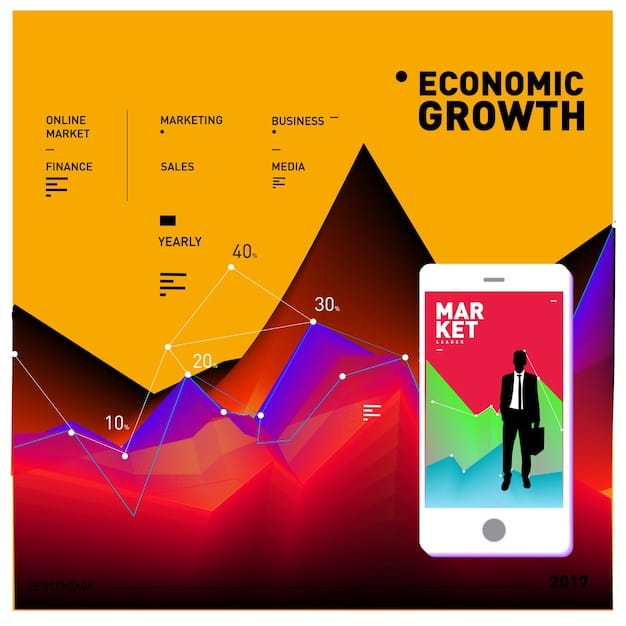Turn Your Expertise into Passive Income: A US Market Guide

Turning your expertise into passive income in the US market involves creating and selling digital products tailored to your knowledge and skills, offering continuous earnings with minimal ongoing effort.
Want to transform your skills into a reliable income stream? The US market is ripe with opportunities to turn your expertise into passive income by creating and selling digital products. Let’s explore how.
Identify Your Expertise and Target Audience
To successfully create passive income, start by pinpointing what you’re truly good at. Then, determine who would benefit most from your knowledge.
What are You Passionate About?
Begin by listing your skills and passions. What do people often ask you for help with? Identifying this intersection is key.
Next, consider your market niche. Is there a demand for your expertise? Analyzing market trends can reveal untapped opportunities.

Define Your Ideal Customer
Understanding your audience is crucial. What are their pain points? How can your expertise solve their problems?
Conduct market research to gather data on your potential customers. Use surveys, interviews, and online forums to learn more about their needs.
- Identify their biggest challenges.
- Determine their preferred learning styles.
- Understand their budget constraints.
By defining your ideal customer, you can create digital products that specifically address their needs, increasing the likelihood of sales and recurring income.
In summary, identifying your expertise and defining your target audience lays the groundwork for a successful passive income venture in the US market by ensuring you’re creating products that people actually need and are willing to pay for.
Choose the Right Digital Product Format
Selecting the right format for your digital product can significantly impact its success. Consider what best suits your expertise and audience.
E-books: Share Your Written Knowledge
E-books are a versatile option for sharing in-depth knowledge. They are relatively easy to create and distribute.
Focus on topics that resonate with your target audience and offer unique insights. Consider offering practical advice, case studies, or actionable strategies.
Online Courses: Teach Your Skills Interactively
Online courses provide a structured learning experience, allowing you to teach skills in an engaging manner. Use video lectures, quizzes, and assignments to enhance learning.
Choose a platform that suits your needs, such as Teachable, Thinkific, or Udemy. These platforms offer tools for course creation, marketing, and student management.

Templates and Printables: Offer Practical Tools
Templates and printables provide instant value to your customers. These can range from budget spreadsheets to social media calendars.
Create user-friendly templates that are easy to customize. Provide clear instructions and examples to help users get the most out of your products.
- Budgeting templates
- Social media calendars
- Resume templates
- Project management tools
Selecting the right format for your digital product hinges on what best aligns with your expertise and what your audience is most receptive to, ultimately enhancing engagement and sales.
Create High-Quality Content
The quality of your digital product is paramount. It should be well-researched, accurate, and engaging.
Research and Planning
Before creating any content, conduct thorough research. Ensure your information is up-to-date and accurate.
Develop a detailed outline to structure your content logically. This will help you stay focused and ensure a cohesive learning experience.
Engaging Presentation
Present your content in an engaging manner. Use visuals, such as images, videos, and infographics, to enhance understanding.
Incorporate storytelling techniques to make your content more relatable. Share personal experiences and case studies to illustrate your points.
- Use clear and concise language.
- Break up long blocks of text with visuals.
- Incorporate interactive elements.
Creating high-quality content necessitates meticulous research, strategic planning, and an engaging presentation style to captivate your audience and deliver real value.
Build a Sales Funnel
A sales funnel guides potential customers through the process of learning about and purchasing your digital product. It typically consists of several stages.
Attract Traffic
The first step is to attract potential customers to your website or landing page. Use various marketing channels to drive traffic.
Consider using content marketing, social media marketing, and paid advertising to reach a wider audience. Optimize your content for search engines to improve visibility.
Capture Leads
Once you’ve attracted traffic, focus on capturing leads. Offer a free resource in exchange for their email address.
Create a compelling lead magnet, such as a free e-book, checklist, or video tutorial. Make it easy for visitors to sign up for your email list.
Nurture Leads
Nurture your leads by providing valuable content via email. Build trust and establish yourself as an authority in your field.
Share helpful tips, insights, and resources that address their pain points. Personalize your emails to make them feel valued and understood.
Building an effective sales funnel is essential for guiding potential customers through the purchasing process, increasing conversions and ultimately boosting your passive income.
Choose the Right Platform to Sell
Where you decide to sell your digital products can significantly impact your reach and revenue.
Your Own Website
Selling on your own website gives you full control over branding and customer experience. Use platforms like Shopify or WordPress with WooCommerce.
Set up a user-friendly online store with clear product descriptions and secure payment processing. Offer excellent customer support to build trust and loyalty.
Online Marketplaces
Online marketplaces like Etsy and Creative Market provide access to a large audience. However, they also come with fees and competition.
Optimize your product listings with relevant keywords and high-quality images. Monitor your competition and adjust your pricing accordingly.
- Etsy for creative products.
- Creative Market for design assets.
- Udemy for online courses.
Selecting the right platform to sell your digital products should align with your goals, considering factors such as control, reach, and associated costs to maximize your revenue potential.
Market Your Digital Product Effectively
Effective marketing is crucial for driving sales and generating passive income. Use a combination of strategies to reach your target audience.
Social Media Marketing
Leverage social media platforms to promote your digital product. Share engaging content and interact with your followers.
Use targeted advertising to reach specific demographics and interests. Run contests and giveaways to increase engagement and brand awareness.
Email Marketing
Email marketing is a powerful tool for nurturing leads and driving sales. Segment your email list and send targeted messages based on customer behavior.
Create automated email sequences to guide prospects through the sales funnel. Offer exclusive discounts and promotions to incentivize purchases.
Marketing your digital product effectively involves a strategic combination of social media, email marketing, and content creation to reach your target audience and drive sales.
Automate and Scale Your Business
To truly create passive income, automate as much of your business as possible. This allows you to focus on growth and innovation.
Use Automation Tools
Implement automation tools for tasks such as email marketing, social media posting, and customer support. This will save you time and improve efficiency.
Explore tools like Mailchimp, Buffer, and Zendesk to streamline your operations. Automate repetitive tasks to free up your time for more strategic activities.
Outsource When Possible
Consider outsourcing tasks that you’re not skilled at or that take up too much of your time. This could include graphic design, content creation, or virtual assistance.
Hire freelancers on platforms like Upwork and Fiverr to handle specific projects. Delegate tasks to focus on your core competencies and strategic initiatives.
Automating and scaling your business through the use of technology and strategic outsourcing is key to creating a truly passive income stream from your digital products.
| Key Point | Brief Description |
|---|---|
| 🎯 Expertise Identification | Pinpoint your skills and passions to discover viable digital product ideas. |
| 💻 Digital Product Format | Choose the format (e-book, course, template) that best suits your expertise and audience. |
| 📈 Sales Funnel Creation | Build a funnel to attract, capture, and nurture leads towards a purchase. |
| 🛠️ Automation & Scaling | Automate processes and outsource tasks to scale the business efficiently. |
FAQ Section
You can create e-books, online courses, templates, software, music, or any other digital format that showcases your knowledge and skills. The key is to align the product with what you’re truly good at and what your audience needs.
Conduct market research to identify the demand for your product. Analyze trends, use keyword research tools, and monitor competitor offerings. Also, engage with potential customers on social media to gauge their interest.
Options include your own website (using Shopify or WordPress), online marketplaces like Etsy and Creative Market, and course platforms like Teachable and Udemy. Your website offers more control, while marketplaces provide broader reach.
Utilize social media marketing, email marketing, content marketing, and paid advertising. Optimize your content for search engines by using relevant keywords. Engage with your audience by creating valuable content and running contests.
Automate tasks such as email marketing, social media posting, and customer support using tools like Mailchimp and Buffer. Outsource tasks you’re not skilled at to freelancers. Focus on strategic initiatives and improving your products.
Conclusion
Turning your expertise into passive income with digital products in the US market requires careful planning, high-quality content, and effective marketing. By identifying your skills, choosing the right format, and automating your business, you can create a successful and sustainable income stream.





